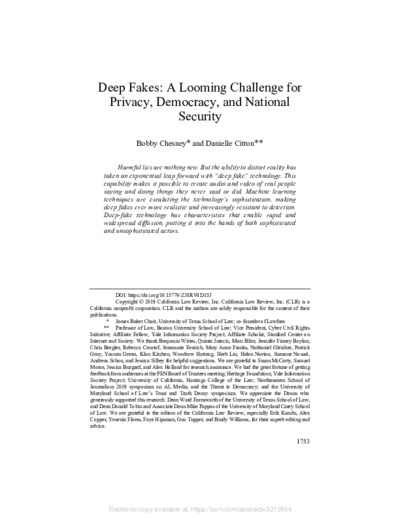 Diese Seite wurde seit 1 Jahr inhaltlich nicht mehr aktualisiert.
Unter Umständen ist sie nicht mehr aktuell.
Diese Seite wurde seit 1 Jahr inhaltlich nicht mehr aktualisiert.
Unter Umständen ist sie nicht mehr aktuell.
 Zusammenfassungen
Zusammenfassungen
Harmful lies are nothing new. But the ability to distort reality has taken an exponential leap forward with “deep fake" technology. This capability makes it possible to create audio and video of real people saying and doing things they never said or did. Machine learning techniques are escalating the technology’s sophistication, making deep fakes ever more realistic and increasingly resistant to detection. Deep-fake technology has characteristics that enable rapid and widespread diffusion, putting it into the hands of both sophisticated and unsophisticated actors.
While deep-fake technology will bring certain benefits, it also will introduce many harms. The marketplace of ideas already suffers from truth decay as our networked information environment interacts in toxic ways with our cognitive biases. Deep fakes will exacerbate this problem significantly. Individuals and businesses will face novel forms of exploitation, intimidation, and personal sabotage. The risks to our democracy and to national security are profound as well.
Our aim is to provide the first in-depth assessment of the causes and consequences of this disruptive technological change, and to explore the existing and potential tools for responding to it. We survey a broad array of responses, including: the role of technological solutions; criminal penalties, civil liability, and regulatory action; military and covert-action responses; economic sanctions; and market developments. We cover the waterfront from immunities to immutable authentication trails, offering recommendations to improve law and policy and anticipating the pitfalls embedded in various solutions.
Von Bobby Chesney, Danielle Citron im Text Deep Fakes: A Looming Challenge for Privacy, Democracy, and National Security (2018) While deep-fake technology will bring certain benefits, it also will introduce many harms. The marketplace of ideas already suffers from truth decay as our networked information environment interacts in toxic ways with our cognitive biases. Deep fakes will exacerbate this problem significantly. Individuals and businesses will face novel forms of exploitation, intimidation, and personal sabotage. The risks to our democracy and to national security are profound as well.
Our aim is to provide the first in-depth assessment of the causes and consequences of this disruptive technological change, and to explore the existing and potential tools for responding to it. We survey a broad array of responses, including: the role of technological solutions; criminal penalties, civil liability, and regulatory action; military and covert-action responses; economic sanctions; and market developments. We cover the waterfront from immunities to immutable authentication trails, offering recommendations to improve law and policy and anticipating the pitfalls embedded in various solutions.
 Dieser wissenschaftliche Zeitschriftenartikel erwähnt ...
Dieser wissenschaftliche Zeitschriftenartikel erwähnt ...
 Personen KB IB clear | Donald Trump |
 Aussagen KB IB clear | deep fakes fördern die Lügen-Dividende |
 Begriffe KB IB clear | cognitive biascognitive bias
,  deepfake
, deepfake
,  Demokratie Demokratie democracy
, Gruppenpolarisation
, democracy
, Gruppenpolarisation
,  Lernen Lernen learning
, Lügner-Dividende
, learning
, Lügner-Dividende
,  machine learning
, microbloggingmicroblogging
, machine learning
, microbloggingmicroblogging
,  Phishing
, Phishing
,  Privatsphäre Privatsphäre privacy
, Realitätreality
, privacy
, Realitätreality
,  Vertrauen Vertrauen trust trust
|
 Zitationsgraph
Zitationsgraph
 Zitationsgraph (Beta-Test mit vis.js)
Zitationsgraph (Beta-Test mit vis.js)
 7 Erwähnungen
7 Erwähnungen 
- The liar’s dividend, and other challenges of deep-fake news (Paul Chadwick) (2018)


- New Laws of Robotics (Frank Pasquale) (2020)

- Should you believe Wikipedia? - Online Communities and the Construction of Knowledge (Amy Bruckman) (2022)

- Trafficking Data - How China Is Winning the Battle for Digital Sovereignty (Aynne Kokas) (2022)

- GPT-4 Technical Report (OpenAI) (2023)


- Practicing Sovereignty. Interventions for Open Digital Futures - Proceedings of the Weizenbaum Conference 2022 (2023)


- Deepfakes und manipulierte Realitäten - Technologiefolgenabschätzung und Handlungsempfehlungen für die Schweiz (Murat Karaboga, Nula Frei, Manuel Puppis, Daniel Vogler, Patric Raemy, Frank Ebbers, Greta Runge, Adrian Rauchfleisch, Gabriele de Seta, Gwendolyn Gurr, Michael Friedewald, Sophia Rovelli) (2024)


 Anderswo finden
Anderswo finden
 Volltext dieses Dokuments
Volltext dieses Dokuments
 |  Deep Fakes: A Looming Challenge for Privacy, Democracy, and National Security: Artikel als Volltext ( Deep Fakes: A Looming Challenge for Privacy, Democracy, and National Security: Artikel als Volltext ( : :  , 691 kByte; , 691 kByte;  : :  2021-03-21) 2021-03-21) |
 Anderswo suchen
Anderswo suchen 
 Beat und dieser wissenschaftliche Zeitschriftenartikel
Beat und dieser wissenschaftliche Zeitschriftenartikel
Beat hat Dieser wissenschaftliche Zeitschriftenartikel während seiner Zeit am Institut für Medien und Schule (IMS) ins Biblionetz aufgenommen. Beat besitzt kein physisches, aber ein digitales Exemplar. Eine digitale Version ist auf dem Internet verfügbar (s.o.). Es gibt bisher nur wenige Objekte im Biblionetz, die dieses Werk zitieren.









 Biblionetz-History
Biblionetz-History